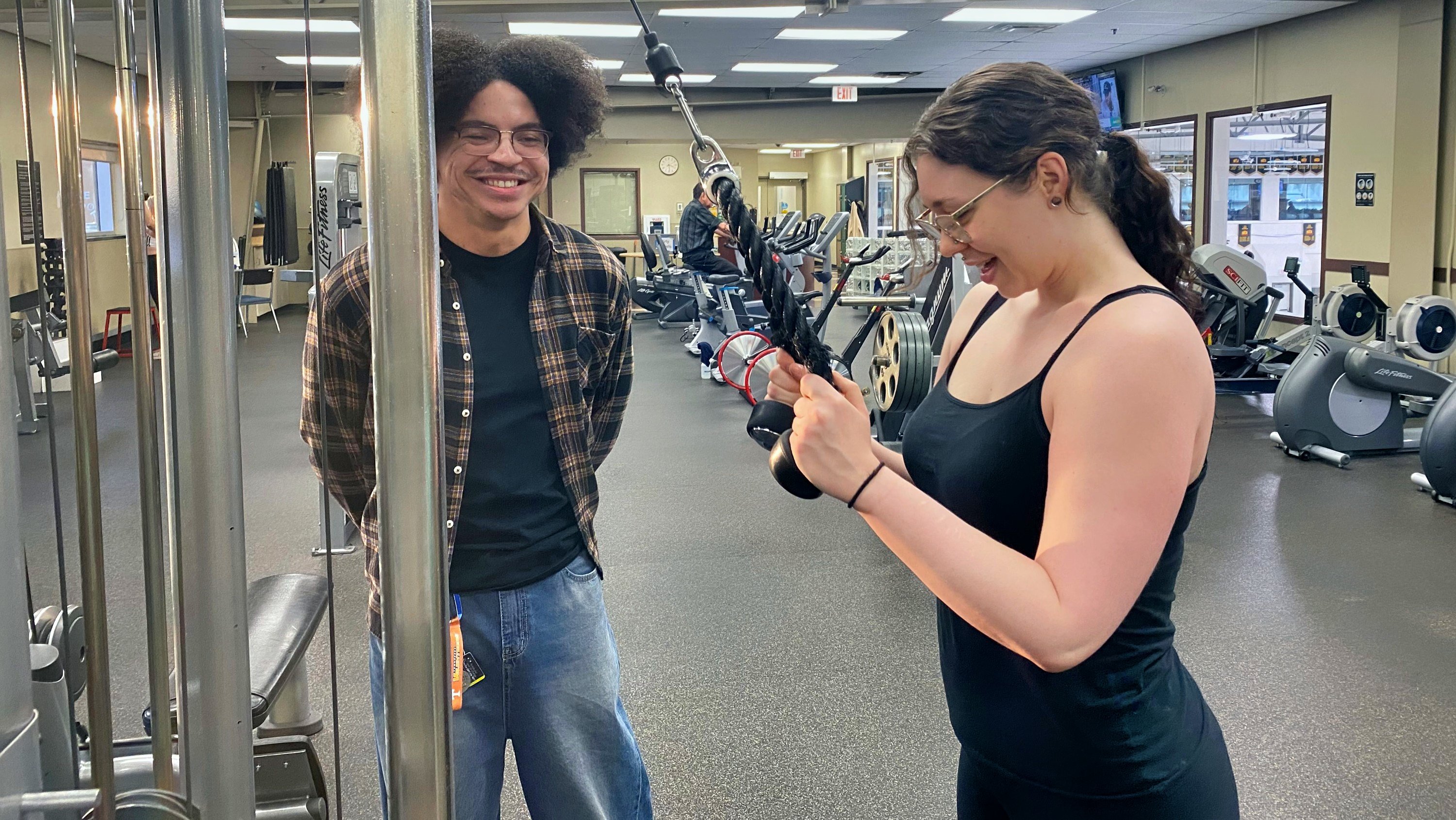When Donald arrives at the Indigenous Wellness Clinic weekly exercise session at the University of Alberta’s Saville Community Sports Centre, he heads straight to the bike for a warm-up session before his workout.
But not before he is greeted by his physiotherapist Allyson Jones and the student volunteers who are committed to guiding him and the other program participants through their fitness regimen.
Donald was recovering from a virus and experiencing serious lung issues when he made his way to the clinic. “I was miserable, but through prayer and my time at the Saville Centre, I’ve gained patience and resilience. An hour here energizes me for a week,” he says.
Jones, a professor in the Faculty of Rehabilitation Medicine and physical therapist at the Indigenous Wellness Clinic, started the program in 2018.
“Our goal is to provide a safe and encouraging space for participants to continue their fitness journey within the community,” she says. “The program is also a unique opportunity for kinesiology, occupational therapy and physical therapy students to engage in meaningful community service.”
Student volunteers deepen their understanding of Indigenous communities through active listening to understand their clients’ insights and challenges, and empower them to take an active role in their wellness journeys.
“The weekly, one-hour sessions are held in a fully equipped weight room. It’s rarely busy here, so clients can exercise in a relaxed environment. The program is free and there is no structured commitment for clients,” says Jones, who is also a member of the Women and Children’s Health Research Institute.
The students lead clients through exercises designed to assist with a variety of health issues, from alleviating joint stiffness to managing diabetes and improving cardiovascular fitness.
Donald says his life has been profoundly changed by his experience at the centre.
“Three years ago I had many health challenges and financial constraints to join a gym, and when I discovered this program my overall speed, strength and stamina improved.”
Donald started with simple exercises and later progressed to more challenging equipment like bikes and press machines. “This slow progress helped me build confidence,” he says.
Positive experiences for clients and students
Delton Owens, a second-year student in the Faculty of Kinesiology, Sport, and Recreation from Kehewin Cree Nation, says working with Donald has been a positive experience for both of them.
“Donald was one of my first clients. Initially, I was nervous about moving too slowly or too intensely. However, as we worked together, things started to flow more naturally. The key turned out to be patience and understanding his unique needs. It felt like an open dialogue where both sides were learning.
“My first week here really felt like embarking on a new partnership. Now, looking at how much Donald has progressed, it’s astonishing to see the change.”
Owens is keen to expand his knowledge in the field of Indigenous health. “I would like to explore various angles of Indigenous-focused therapy. For me, physical rehabilitation is a gateway to overall well-being. My clients’ journeys are not just physical — it’s an all-encompassing path to personal development and well-being.”
He says he has a deep commitment to understanding Indigenous cultures, histories and health challenges, and he’s benefited from taking some of the online courses available through the U of A’s Faculty of Native Studies.
“This understanding is crucial to the work I do,” he says. “It informs my approach to rehabilitation and therapy, making it more effective and culturally sensitive.”
A space for connection and support
Maia Fehr, a second-year master’s student in occupational therapy, says the program offers something more profound than just helping people sustain exercise routines.
“It’s created a space for participants to form connections with each other and with people like me, Allyson and others, offering a supportive environment,” she says.
“Often, we find ourselves engaged in meaningful conversations about various aspects of their lives. It’s the shared activity that naturally supports this kind of open dialogue, which is really special.”
Fehr was drawn to occupational therapy because of her passion for health care that focuses on mind and body, but she says as she nears graduation, “it’s been increasingly important for me to broaden my cultural perspective and enhance my competency in providing culturally safe care.”
“I chose to enrol in an Indigenous module at university, which was incredibly beneficial. There are significant differences between the health-care perspectives and treatments offered from a western viewpoint and those from an Indigenous perspective,” she says.
According to Fehr, the focus of the program is not on rigorous workouts or aesthetic goals, but on gradual, meaningful improvements in physical and mental health.
“Many clients are seeing positive results from putting that extra effort into moving their body, but also becoming motivated to improve other components of their life, like their nutrition.”
“Flexibility is crucial in providing personalized attention and support to each client, whether working one-on-one or alternating between individuals,” she adds.
As for Donald, he reports remarkable improvements in his overall well-being since joining the program.
“I’m grateful Allyson told me about the program. With my health and fitness improving, I’m no longer feeling miserable. I look forward to coming each week. It gives me a huge boost of energy.”
